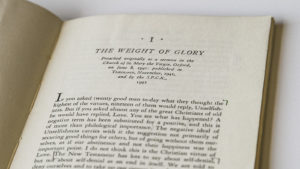 “Christianity asserts that every individual human being is going to live forever, and this must be either true or false,” C. S. Lewis states in Mere Christianity. “Now there are a good many things which would not be worth bothering about if I were going to live only seventy years,” he continues, but concludes, “but which I had better bother about very seriously if I am going to live forever.”
“Christianity asserts that every individual human being is going to live forever, and this must be either true or false,” C. S. Lewis states in Mere Christianity. “Now there are a good many things which would not be worth bothering about if I were going to live only seventy years,” he continues, but concludes, “but which I had better bother about very seriously if I am going to live forever.”
The problem is that most people don’t want to think that seriously about things that matter. When it comes to the most important part of life—the issue of eternity—they would like to fall back on the various “feel-good” beliefs: “I’m not any worse than that person”; “The good I’ve done will outweigh the bad”; “A God of mercy surely wouldn’t send anyone to hell.”
The list may be endless.
Lewis would have none of that fuzzy, baseless thinking:
A vague religion—all about feeling God in nature, and so on—is so attractive. It is all thrills and no work; like watching the waves from the beach.
But you will not get to Newfoundland by studying the Atlantic, and you will not get eternal life by simply feeling the presence of God in flowers or music.
People avoid the hard issues: the presence of sin in one’s life; the guilt that accompanies it; the nagging sense that no matter what one does to push away that guilt, nothing is sufficient.
We want an easy, accountability-free existence. But that’s not reality. It wasn’t easy for Jesus to empty Himself of his Godhead and live as a man. There was nothing easy about what He suffered on our behalf. He had to go through the portals of death (physical) and a crucial moment on the cross when He was, for the first time ever, separated from the Father.
He had to die in order to be resurrected and give us the hope of eternity with God. There’s a principle here that applies to us; Lewis explains it succinctly in his “Membership” essay:
A rejection, or in Scripture’s strong language, a crucifixion of the natural self is the passport to everlasting life. Nothing that has not died will be resurrected.
 There’s no getting around it: we must die to our self-centeredness. We hate the idea, but once we do it, we realize that’s where true life resides. As Lewis so poignantly puts it in “The Weight of Glory,”
There’s no getting around it: we must die to our self-centeredness. We hate the idea, but once we do it, we realize that’s where true life resides. As Lewis so poignantly puts it in “The Weight of Glory,”
We are half-hearted creatures, fooling about with drink and sex and ambition when infinite joy is offered us, like an ignorant child who wants to go on making mud pies in a slum because he cannot imagine what is meant by the offer of a holiday at the sea. We are far too easily pleased.
It’s time to stop being ignorant children.
